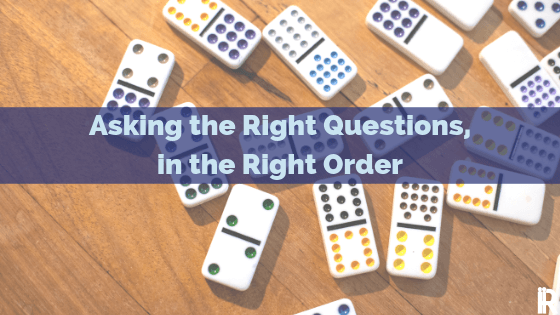“How should we communicate?”
It’s a great question, and should be asked when putting together any communication plan, simple or complex. The problem is that it’s one of the right questions, just in the wrong order. By asking them in the right order, you’ll have the information you need to build a better, and more effective, message to communicate.
To your customers, to your friends, to your employees.
The five “Ws” are the staple of telling any story: Who is involved? What happened? Where did it happen? When did it go down? Why does it matter? and of course the bonus “H”…How did it happen? There’s obviously a few more questions you can ask to flesh out a story using these five questions, but you get the idea. And to really communicate to people, whether it’s your employees, customers, friends, loved ones, etc., it’s really important to lay this kind of ground work down before you try to get your message across.
And the order matters, because you can’t answer questions like “how” or “where” if you don’t build off a good foundation of “why” and “who”.
For example: Your company is consistently tweeting, 10 times a day, about the great achievements of your company and its latest products to your prospective and current customers but you find that no one is clicking on your links, retweeting your info or engaging at all.
OR
You send a weekly email to your staff around CEO updates and company news but your staff barely mention it or find it useful, even mentioning to their supervisors that they just delete it without reading it.
You aren’t asking the right questions in the right order. Make your way through the checklist.
[checklist]
- Why – the grandaddy question of them all. WHY are you communicating and what is your intent? This is by far the most important question to answer and will fuel every decision and consideration after it. I’d even argue that if you don’t know why you are communicating something, you shouldn’t be doing it. Knowing the answer to this question will cut down on wasteful time, give you a purpose in relaying your message and help you know if you’ve been successful. The person you’re communicating to will appreciate it, whether they know your “why” or not.
- Who – when done right, communication is a two-way experience. It’s vital that you understand your audience, so you can craft your message to suit their interests and needs. Interests, gender, work schedule, family, internal politics, pet peeves…all ingredients in creating not only good communication, but the RIGHT communication.
- What – it’s now about content. What are you saying and what tone are you using? If you understand why you are communicating and who you’re talking to, you’ll have a much better understanding of the message they want to hear and what it will take to reach them how you’ve defined success. Content is extremely important but can’t be created properly without the Whys and the Whos.
- Where – there are a lot of mediums and platforms to use to get your message across. It’s important you use the right ones. It’s a waste of effort to use Twitter if you know your audience prefers getting updates on a message board (old school!). Where are they spending their time to get information? Use what they use. You’d be amazed what networks already have buy in and are effective.
- When – Is there a frequency that your audience preferences? The last thing people want is more emails (spam) or more meetings (distractions) or maybe they do? The best thing to do is not assume you know best and ask them, so you are sharing something to look forward to rather than “one more thing” they have to listen to or read.
- How – check your resources and skill sets. At this point you know why you’re doing this, who you’re talking to, what you want to say, where you’re going to reach them, and when is most effect to share your message. Finally, you need to know if you have the tools for the job. If video is the best medium, do you have a videographer or editor on staff? If it’s a podcast, do you have anyone with audio skills? If it’s an email, do you know someone who can craft a message that’s engaging and effective?
[/checklist]
It might seem like a lot of work to do this before communicating but if you don’t have the information you need to relay your message, your efforts could either be wasted or your social capital could be eroded. How many times have you received an email you didn’t read? Or rolled your eyes at some message that didn’t speak to you at all?
It’s because the right questions with the right answers weren’t considered. Don’t make that mistake if you want to effectively communicate. (totally almost rhymed)






